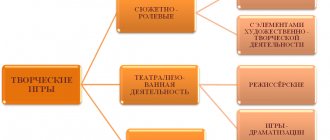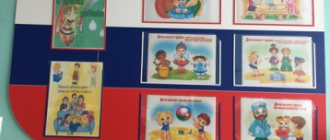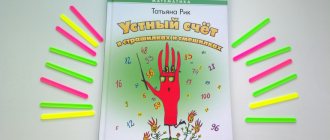Methodological recommendations for organizing play activities in modern preschool educational institutions
Organization of children's play activities
in a modern kindergarten
Play is a special activity that blossoms in childhood and accompanies a person throughout his life. It is not surprising that the problem of play has attracted and is attracting the attention of researchers, not only teachers and psychologists, but also philosophers, sociologists, ethnographers, and biologists.
There are a number of theories that look at the game from two points of view:
- play as an activity in which the child develops holistically, harmoniously, comprehensively;
- game as a means of acquiring and developing knowledge.
It is now generally accepted that play is the leading activity of a preschool child. Let me remind you that the psychologist A. N. Leontiev considered the leading activity to be one that has a special impact on the development of the child at a given age. For young children, the leading activity is object-based activity; for children of younger and older preschool age, the leading activity is play.
Developing character
The game is that it puts forward a number of requirements for the child:
• The first requirement
addressed to the child from the role-playing game is an action in the imaginary plane. This moment is noted by all game researchers, although it receives different names. The need to act on an imaginary plane leads to the development of the symbolic function of thinking in children, the formation of a plan of ideas, and the construction of an imaginary situation.
• Second requirement
- the child’s ability to navigate in a certain way in the system of human relationships, since the game is aimed precisely at their reproduction. The main content of the relationships that are modeled in the game consists of various combinations of subordination of social roles. It is this content that is primarily the subject of mastery for the child.
• Third requirement
- formation of real relationships between playing children. Playing together is impossible without coordination of actions. In the process of such coordination, children develop “social qualities”, in the terminology of A.P. Usovaya, i.e. qualities that provide a certain level of communication.
This is the main specific developmental value of role-playing games.
In addition, there is experimental data on the development of voluntary behavior control in the game,
initial forms
of intentional memorization, activity, organization.
It is also generally accepted that the game develops knowledge about the phenomena of social life, the actions and relationships of adults, etc.
So, we all know how important play is for preschool children, we are all aware of the fact that the development of children in preschool is ineffective outside of play.
And yet, we are forced to admit that play is “moving away” from kindergarten; children practically do not play. And there are several reasons for this.
• Children have few impressions, emotions, holidays, without which the development of play is impossible. Children receive most of their impressions from television programs, the quality of which, unfortunately, leaves much to be desired.
• Game is a reflection of the life of adults: while playing, a child imitates them, models various sociocultural situations and relationships. But, perhaps, for the first time in many years, educators in large cities, in particular Moscow, are faced with the fact that children do not know what their parents are doing. Mysterious abbreviations appear in the “Information about parents” column, and in the “position” column - realtors, managers, dealers, agents, referents, etc. Parents cannot clearly explain to their child what they are doing. Only the activities of adults that are directly observed in life remain. But there are very few of them. The professions of salesman, postman, tailor and cutter have left children's direct observation. Meanwhile, conditions for these games are being created; many kindergartens have artificially created play areas. But the attributes for these games gather dust on the shelves, not arousing much interest among children.
• Adults do not play. It is impossible to teach a game other than by playing with a child.
Also, one of the good reasons for the departure of the game from preschool educational institutions is our desire to “please” parents, as a result of which teachers do nothing but “work” with children, trying to tell them as much information as possible. There is practically no time left to play. In this case, such a common phrase as “social order” is used. In fact, this notorious social order is used by many as an excuse, dictated by the reluctance and inability to organize a children's game.
Meanwhile, there is time to play in preschool educational institutions - this is laid down in the regulatory documents that are fundamental for us, in particular in the instructional and methodological letter “On Hygienic Requirements...”, in the new SanPiNs.
Another problem is to restore in adults and teachers the ability to play with children and competently lead
children's game.
Method of integrated game management.
It was proposed by E.V. Zvorygina and S. L. Novoselova. (See diagram)
Currently, in the practice of preschool institutions, this method is often used in the presence and interrelation of the following pedagogical conditions: active activity of children aimed at familiarizing themselves with the environment; educational games; timely change of the subject-game environment; activating communication between the teacher and children during the game itself.
1. Systematic enrichment of children's experience.
In everyday life, in class, on a walk, while reading books, watching TV programs, the child learns the purpose of objects, the meaning of people’s actions, the essence of their relationships, and his first emotional and moral assessments are formed. All this can serve as a source for the emergence of the game’s concept and the constant enrichment of its content.
2. To translate real experience into a game, conditional plan, for children to learn ways to reproduce reality in the game, educational games
(didactic, theatrical, etc.) They must contain elements of novelty, introduce children into a conditional situation, and emotionally involve them in the process of acquiring knowledge.
3. Timely change of the gaming environment,
selection of toys and gaming material that help to consolidate in the child’s memory recent impressions received while getting to know the environment, as well as in educational games, guide preschoolers toward independent, creative solving of gaming problems, and encourage different ways of reproducing reality in play. The object-game environment needs to be changed taking into account the practical and play experience of children. It is important not only to expand the theme of toys, but also to select them according to the principle of varying degrees of generalization of the image.
4. To consolidate the activity experience acquired by children in independent initiative play, it is necessary for them to communicate with an adult
during gameplay. Communication should be aimed at the formation of progressive (for
.of each age period) ways to solve game problems. To do this, the teacher organizes the activities of preschoolers in increasingly complex problem game situations, taking into account their specific practical experience, as well as the game environment.
All components of comprehensive guidance in the development of play are interconnected and equally important when working with children of different ages. The level of game development achieved as a result of such guidance at this age stage allows the teacher to go further, taking into account the new capabilities of his students.
Having examined the management of preschoolers’ play, it is necessary to draw the following conclusions:
• The game should be free from themes and regulation of actions imposed by adults “from above.” The child must have the opportunity to master the increasingly complex “language” of play - the general ways of its implementation, increasing the freedom to creatively realize his own ideas.
Play should be a joint activity of the teacher and children, where the teacher is a playing partner, so that play at all age stages is an independent activity of children.
To develop gaming activities, it is necessary to fulfill several conditions: the creation of a subject-specific development environment, the availability of a certain time in the daily routine and the professionalism of teachers. Without these conditions being met, it is impossible to develop children's creative, amateur play.
It has already been said that one of the reasons for the “departure” of play from kindergarten is the desire of teachers to bring the educational process in a preschool institution as close as possible to the “school” model. Teachers devote most of their time and attention to activities with children, forgetting about the importance of independent children’s play and its significance for children's development. “We don’t have time to play! He’s sorely missed!” - say the teachers.
This is wrong. There is time to play. It is included in any comprehensive preschool education program. Having analyzed the programs and the daily routines proposed in them, as well as the instructional and methodological letter “On Hygienic Requirements...” and the new Sanitary Regulations and Regulations, we came to the conclusion that in the daily routine of children in kindergarten, time is allocated for play. Guided by these documents, methodologists developed a scheme that takes into account all the regime aspects of children’s stay in a preschool institution. It shows that children of different age groups are given from 3 hours 15 minutes to 3 hours 30 minutes to play during the day. The main goal of teachers is to use this time correctly, in every possible way encouraging children to play independently, participating in them and helping
children learn new ways to play.
Home EDUCATION… Preschool… Recommendations for childbirth…
Recommendations for parents on organizing play activities for a preschooler at home
“Playing with children develops the mind, mind, and soul!”
Every parent dreams of his child growing up smart, independent, and taking a worthy place in the life of society in the future.
The child does not show as much interest in any activity as in play. He is interested, which means that learning and development occurs easily and with pleasure. This is the secret of the educational potential of the game. And they are huge:
- Games develop the cognitive abilities of the individual - attention, memory, perception, thinking, imagination, train observation, intelligence, develop children's creative abilities, form the emotional and sensory sphere of children's personality;
- Promote the child's self-discovery. By voluntarily obeying the rules of the game, children learn self-discipline, perseverance, endurance - all those strong-willed qualities without which it is difficult to live and achieve set goals and objectives.
The child’s play reflects various events he experienced in kindergarten, family, and when communicating with different people. The game allows the child to become familiar with many properties and qualities of the objects around him; imitate adult family members in actions, speeches, facial expressions, gestures, and work activities. When playing, the baby seems to put himself in the position of the adult he is imitating. In the role of an adult, he tries to carry out his activities and behavior. By repeatedly repeating the same plot (for example, feeding a doll), the child consolidates forms of behavior and relationships between loved ones. In a playful role, he imitates not only the actions, but also the relationships, feelings, and experiences of adults (mothers, fathers, grandparents, brothers and sisters).
All this happens if the games of preschoolers are under the supervision of an adult, if it is built on meaningful communication between adults (parents) and the child.
An important pedagogical condition that promotes the development of a child’s play is the selection of toys. The toy prompts the baby to the theme of the game and creates playful connections. Sometimes a shoebox is more important to a child than an expensive car. You can use it in different ways: carry building material, turn it into a bed for a doll or into a stroller for a walk. A child's play area should have a variety of toys.
Figurative, motor, and didactic (educational) toys are important. The more diverse the types of toys a child has, the more varied his games. But a variety of toys does not mean a large number of them. It is enough to have 2-3 toys of the same type.
When buying a toy, pay attention not only to their novelty, attractiveness, cost, the main thing when buying a toy is their pedagogical expediency. Before you make a purchase, ask your child what games the new toy will need.
When the conversation turns to where to store toys, adults usually complain about the lack of space. But even if there is a separate room, children are not given a play corner. Toys are usually put in boxes, and if the toy is not in the child’s field of vision, then it does not provoke him to play, the baby cannot start the game, create a play situation. Toys must be kept open. Having a permanent place to store toys does not mean that your baby can only play in a certain place. The child strives to play where the adult family members are. He needs constant help, support from adults, and their encouragement. He can choose the kitchen, grandma's room and other rooms as a place to play.
Changing the play environment evokes new play associations in children, influences the choice of topic, generalizes play and moral experience, helps children master toys, and develops their ability to play.
The participation of adults in children's games can vary. If you just bought a toy and the baby knows how to play with it, it is better to give him the opportunity to act independently. But soon the experience wears out and the toy becomes uninteresting. Tell your child new play actions with it, play with him, advise what role he can take on when playing with the toy. Don’t rush to throw away broken toys, fix them together with your child and play with this repair. Make your own toys.
Learn to play checkers and chess, especially dads and grandfathers, and you can organize interesting and useful leisure time with your older preschool children.
Instill in children a love of gaming entertainment - charades, puzzles, puzzles, crosswords. They broaden their horizons, develop resourcefulness and ingenuity.
Use Russian folklore, counting rhymes, tongue twisters, riddles, and proverbs in games. These are treasures of folk wisdom.
In Russia, games are called fun; they always help people make life easier, stop grieving, and calm down. Folk games, round dances, and songs are the foundation for the harmonious development of intelligence and the basis for a child’s health. Such simple movements as stretching, clapping, patting the whole body, stamping - massage the biologically active points of the young body. Stomping also helps prevent and treat flat feet and massages internal organs. In addition, folk games have a physiologically based rhythm; the heart beats with the same rhythm.
A child in a big city is like a coiled spring, and he needs to throw out stagnant energy. To do this, you need to give the child the opportunity to scream at the top of his voice, run around, portray animals, birds with his voice and plasticity.
Remember the old games and fun: such as “Peeping Games”, “Freeze”, “Mirror”, “Leapfrog”, “Tag”, “Ali Baba”, etc. Play these games with your children and you will see how happy they will be Children, how will your bad mood disappear? By playing these games, you and your children receive a huge physiological and psychological boost of energy.
It's no secret that mothers spend a significant part of their time in the kitchen. Try to use this time to communicate with your child, invite him to play with words - halves, come up with stories, practice pronouncing tongue twisters, etc.
Take walks together in the yard, park, where you can play with sand and outdoor games.
Allow your child to play with water in the bath at home; these games relax and calm aggressive children and develop their minds.
The more time parents devote to their child, the better the relationship between them. Common interests bring the family together and create a friendly atmosphere in it.
We hope that our recommendations will help your child overcome the difficulties that have arisen.
https://www.maam.ru/detskijsad/metodicheskie-rekomendaci-dlja-roditelei-igraite-vmeste-s-detmi.html




